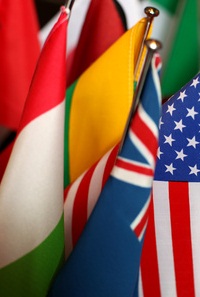Posted on 02 October 2013
 The globe may be entering a post post-cold war era in which multilateralism will become increasingly important.
The globe may be entering a post post-cold war era in which multilateralism will become increasingly important.
Speaking during the Academy of Global Governance’s “The EU as a Global Actor” executive training, EUI Professor Ulrich Krotz said the era of hegemonic rule is coming to an end and international relations are dominated by multilateralism.
“You have the stereotypes,” summarised course organiser Professor Anna Triandafyllidou, “The 19th century was the British century, the 20th century was the American century, so whose century is the 21st? Krotz said it will be nobody’s century.”
Such an approach does not necessarily require a federal Europe: “We see it as a zero sum game that the EU either acts as supranational, or intergovernmental or as single countries. But it acts often with these three voices at the same time.”
At the same time, but at different volumes depending on the context. Currently the EU has a single representative at the WTO, but member states still sign trade deals with individual nations. Each member state is free to decide its own foreign policy, but the EU has a High Representative for Foreign Affairs.
The EU may send unified peacekeepers abroad but contributions to such forces vary depending on the location of operations. A higher percentage of French soldiers make up missions to Africa for example, while British representation is more common in Asia.
The training also discussed integration, the EU’s approach to which can also be seen through the prism of multilateralism.
“Integration is a prerogative of the member states. The EU has a procedural role. There are 11 integration guidelines, but they don’t suggest policy. These act as a real push to some countries but respects that EU countries have very different traditions in diversity,” says Triandafyllidou.
A new pluralism is developing in how the EU approaches diversity, with a more co-operative approach taking the place of dictates.
“There is more recognition of the legacy of central and eastern [European] countries where they don’t have a lot of immigration, but they have native minorities and an imperial legacy of living together, even if these empires were not democracies.”
The Academy of Global Governance runs a series of topical training programmes similar to “The EU as a Global Actor. Internal and External Challenges and Constraints” . For more information please visit their website.